In February 2021, a chilling crime unfolded in Grand Junction, Colorado, when 19-year-old Brian Cohee committed the brutal murder of 69-year-old Warren Barnes, a homeless man. This case not only shocked the local community but also garnered national attention due to its gruesome nature and the psychological complexities surrounding the perpetrator.
Background of Brian Cohee
Brian Cohee, at the time of the crime, was a 19-year-old resident of Grand Junction, Colorado. He had a documented history of mental health issues, including diagnoses of autism spectrum disorder and attention deficit hyperactivity disorder (ADHD). Throughout his life, Cohee exhibited disturbing behaviors, such as an obsession with serial killers and a fascination with death. These interests were evident in his online activities and personal writings, where he frequently referenced notorious figures like Jeffrey Dahmer and Edmund Kemper.

The Murder of Warren Barnes
On February 27, 2021, Cohee encountered Warren Barnes, a 69-year-old homeless man, sleeping near Crosby Avenue in Grand Junction. Seizing the opportunity, Cohee approached Barnes and, without provocation, began stabbing him repeatedly. During the attack, Barnes reportedly cried out, “What are you doing, why, why?” in a state of panic. Cohee later described himself as making “animalistic noises” during the assault. After ensuring Barnes was dead, Cohee proceeded to decapitate him and sever his hands, placing these body parts into plastic bags. He then transported the remains to his home, hiding them in his bedroom closet.
Discovery and Arrest of Brian Cohee
The gruesome discovery came to light on March 1, 2021, when Cohee’s parents were cleaning his room and found the decomposing head and hands in his closet. Horrified, they immediately contacted the authorities. Upon arrival, Cohee approached the police officers and calmly confessed to the murder, stating, “I’ve always wondered what murder felt like.” He provided detailed information about the crime, including the victim’s identity, the weapon used, and the location of the murder. Cohee was subsequently arrested and taken to the Mesa County Detention Facility.
Psychological Evaluation and Trial of Brian Cohee
During the legal proceedings, Cohee’s mental state became a focal point of discussion. His defense team argued that his diagnosed mental health disorders impaired his ability to distinguish right from wrong, suggesting that he was legally insane at the time of the crime. However, the prosecution presented evidence of Cohee’s meticulous planning and his clear understanding of the consequences of his actions. They highlighted his deliberate choice of a vulnerable victim and his efforts to conceal the crime. Ultimately, the jury found Cohee guilty of first-degree murder, rejecting the insanity defense. He was sentenced to life imprisonment without the possibility of parole.

Community Impact and Reflection
The murder of Warren Barnes sent shockwaves through the Grand Junction community. Barnes, affectionately known as “The Reading Man” due to his love for books, was a familiar figure in the area. Despite his homelessness, he was described by many as kind-hearted and hardworking. In the aftermath of his death, community members organized memorials and installed a sculpture in his honor at the spot where he often spent his time. This tragedy also sparked discussions about mental health awareness, the importance of early intervention, and the need for comprehensive support systems for individuals exhibiting concerning behaviors.
Conclusion
The case of Brian Cohee serves as a grim reminder of the potential consequences of untreated mental health issues and the importance of community vigilance. It underscores the necessity for accessible mental health resources and the critical role of early intervention in preventing such tragedies. As the community of Grand Junction continues to heal, the memory of Warren Barnes stands as a testament to the impact one individual can have, and the profound loss that violence inflicts on a community.
